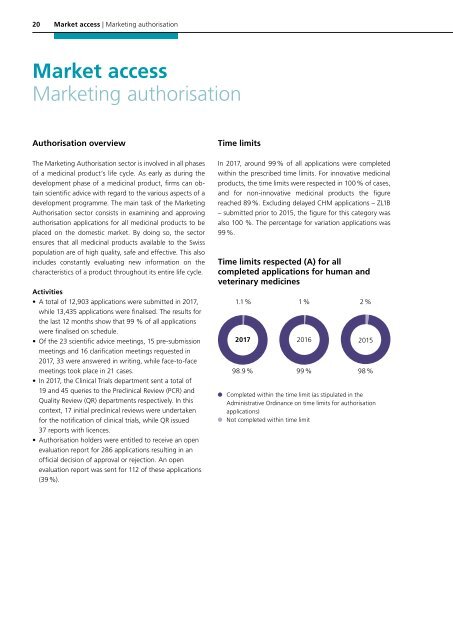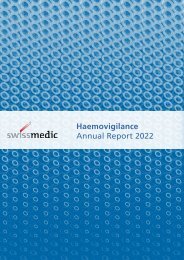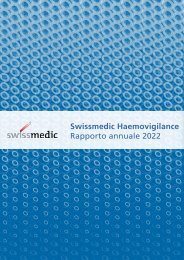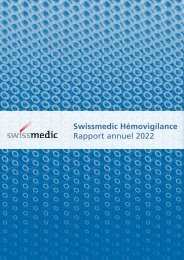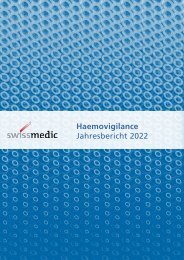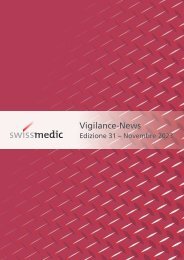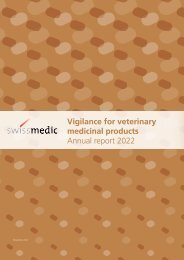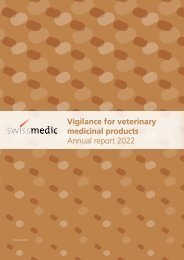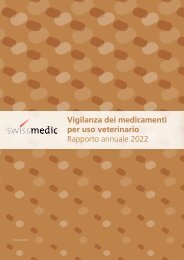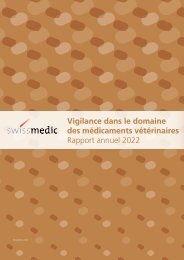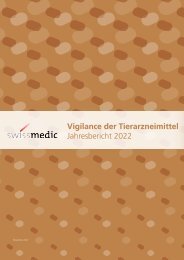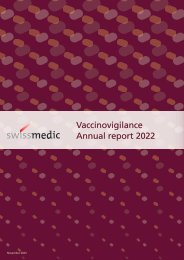Swissmedic Annual Report 2017: achieving success through collaboration
According to Stéphane Rossini, incoming Chairman of the Agency Council, the culture of collaboration will remain a factor in ensuring that Switzerland is successful in retaining a high-quality medicines control system: “A globalised economy and the international consumption of therapeutic products entail synergies and collaboration.”
According to Stéphane Rossini, incoming Chairman of the Agency Council, the culture of collaboration will remain a factor in ensuring that Switzerland is successful in retaining a high-quality medicines control system: “A globalised economy and the international consumption of therapeutic products entail synergies and collaboration.”
Create successful ePaper yourself
Turn your PDF publications into a flip-book with our unique Google optimized e-Paper software.
20 Market access | Marketing authorisation<br />
Market access<br />
Marketing authorisation<br />
Authorisation overview<br />
The Marketing Authorisation sector is involved in all phases<br />
of a medicinal product’s life cycle. As early as during the<br />
development phase of a medicinal product, firms can obtain<br />
scientific advice with regard to the various aspects of a<br />
development programme. The main task of the Marketing<br />
Authorisation sector consists in examining and approving<br />
authorisation applications for all medicinal products to be<br />
placed on the domestic market. By doing so, the sector<br />
ensures that all medicinal products available to the Swiss<br />
population are of high quality, safe and effective. This also<br />
includes constantly evaluating new information on the<br />
characteristics of a product <strong>through</strong>out its entire life cycle.<br />
Activities<br />
• A total of 12,903 applications were submitted in <strong>2017</strong>,<br />
while 13,435 applications were finalised. The results for<br />
the last 12 months show that 99 % of all applications<br />
were finalised on schedule.<br />
• Of the 23 scientific advice meetings, 15 pre-submission<br />
meetings and 16 clarification meetings requested in<br />
<strong>2017</strong>, 33 were answered in writing, while face-to-face<br />
meetings took place in 21 cases.<br />
• In <strong>2017</strong>, the Clinical Trials department sent a total of<br />
19 and 45 queries to the Preclinical Review (PCR) and<br />
Quality Review (QR) departments respectively. In this<br />
context, 17 initial preclinical reviews were undertaken<br />
for the notification of clinical trials, while QR issued<br />
37 reports with licences.<br />
• Authorisation holders were entitled to receive an open<br />
evaluation report for 286 applications resulting in an<br />
official decision of approval or rejection. An open<br />
evaluation report was sent for 112 of these applications<br />
(39 %).<br />
Time limits<br />
In <strong>2017</strong>, around 99 % of all applications were completed<br />
within the prescribed time limits. For innovative medicinal<br />
products, the time limits were respected in 100 % of cases,<br />
and for non-innovative medicinal products the figure<br />
reached 89 %. Excluding delayed CHM applications – ZL1B<br />
– submitted prior to 2015, the figure for this category was<br />
also 100 %. The percentage for variation applications was<br />
99 %.<br />
Time limits respected (A) for all<br />
completed applications for human and<br />
veterinary medicines<br />
1.1 %<br />
<strong>2017</strong><br />
98.9 %<br />
1 %<br />
2016<br />
99 %<br />
2 %<br />
2015<br />
98 %<br />
Completed within the time limit (as stipulated in the<br />
Administrative Ordinance on time limits for authorisation<br />
applications)<br />
Not completed within time limit


